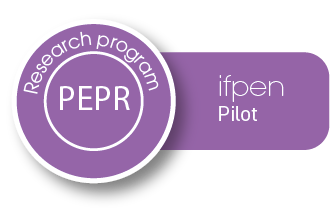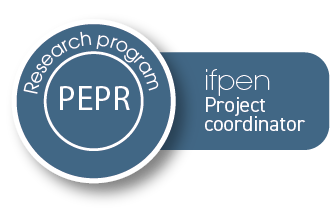A research program dedicated to mobility decarbonization
|
|
 An ambitious program, drawing on the entire national ecosystem, mobilized around the decarbonization of transport
An ambitious program, drawing on the entire national ecosystem, mobilized around the decarbonization of transport
Decarbonizing mobility is a major challenge. The aim of the Digitalization and Decarbonization of Mobility research program is to mobilize and unite all the stakeholders around this challenge: the French scientific community (research bodies, universities, schools), as well as public decision-makers, land-use planners, transport and data operators, infrastructure managers and manufacturers.
Over a period of 8 years, the program supports the objective set by the Ecological Planning initiative of reducing emissions linked to the mobility of goods (30 Mt eq CO2) and people (36 Mt eq CO2) by 66 Mt eq CO2 by 2030. It is part of the France 2030 actions carried out as part of the "Digitalization and decarbonization of mobility" acceleration strategy.
MOBIDEC PEPR
Co-piloted by IFP Energies Nouvelles (IFPEN) and the Université Gustave Eiffel on behalf of the French government, and funded by France 2030, the "Digitalization and Decarbonization of Mobilities" (MOBIDEC) Research Program (PEPR) was launched on 6 December 2023. The program focuses on the collection, analysis and processing of mobility data. It aims to gain a detailed understanding of and anticipate the mobility behavior of goods and people, to make it easier to interpret and process the data, and to provide decision-making tools to simulate the impact of public policies in advance or to assess the relevance of a new transport offering.
> Read more about the MOBIDEC PEPR
IFPEN is also participating in six other PEPRs associated with the French National Acceleration Strategy - “PEPR-SNA” - (a total of 26 nationally) and six Exploratory PEPRs (a total of 17 nationally).
|
|
Key figures
- 30 million in funding
- 3 targeted projects
- 50 doctoral or post-doctoral contracts envisaged
- 1st quarter 2024: 1st call for projects with €8 million in funding
- 1st quarter 2026: 2nd call for projects with €6.5 million in funding
- An 8-year program
The three themed research priorities in the MOBIDEC PEPR
Priority 1 : Improve knowledge surrounding the mobility of people and goods
Priority 2 : Data analysis and processing
Priority 3 : Modeling and simulation to optimize decision-making
“A better understanding of mobility data and their analysis will provide vital tools to help regions reach decarbonization objectives”, underlines Gilles Corde, Program Manager, IFPEN
Discover targeted projects
 MiDMob will focus on understanding usages and the factors that determine individual choices (either by individuals or companies) in terms of the mobility of people and goods;
MiDMob will focus on understanding usages and the factors that determine individual choices (either by individuals or companies) in terms of the mobility of people and goods;
![]() Mob Sci-Dat Factory will be aimed at improving the collection, processing and analysis of heterogeneous mobility data;
Mob Sci-Dat Factory will be aimed at improving the collection, processing and analysis of heterogeneous mobility data;
![]() FORBAC will draw on the results of the first two projects in order to propose decision-making tools making it possible, firstly, to simulate changes (public policies, infrastructures and new offers) and evaluate their impacts, and, secondly, to define objectives (reduction of emissions, costs, etc.) and identify the changes that would enable them to be met
FORBAC will draw on the results of the first two projects in order to propose decision-making tools making it possible, firstly, to simulate changes (public policies, infrastructures and new offers) and evaluate their impacts, and, secondly, to define objectives (reduction of emissions, costs, etc.) and identify the changes that would enable them to be met
IFPEN’s participation falls within the framework of its scientific approach and its different research problems: optimize the processing of large volumes of experimental and simulation data (challenge 4), control and optimize real complex systems (challenge 7) and evaluate the economic and environmental impacts of energy transition innovations (challenge 9).
You may also be interested in
IFPEN and the SPLEEN PEPR
IFPEN is co-pilot with the CNRS of PEPR SPLEEN, an upstream research component serving the national acceleration strategy for the decarbonization of Industry.
IFPEN and the B-BEST PEPR
IFPEN and INRAE are leading the B-BEST PEPR*, the research component supporting the French national acceleration strategy relating to “Bio-based products and industrial biotech - sustainable fuels”






 IFPEN is leading the MOBIDEC PEPR*, an upstream research component supporting the French national acceleration strategy for the digitalization and decarbonization of mobility, alongside Gustave Eiffel University, joint leader of the research program. Integrated in the France 2030 objective, it is aimed at developing an efficient, sovereign and resilient mobility sector.
IFPEN is leading the MOBIDEC PEPR*, an upstream research component supporting the French national acceleration strategy for the digitalization and decarbonization of mobility, alongside Gustave Eiffel University, joint leader of the research program. Integrated in the France 2030 objective, it is aimed at developing an efficient, sovereign and resilient mobility sector. 



